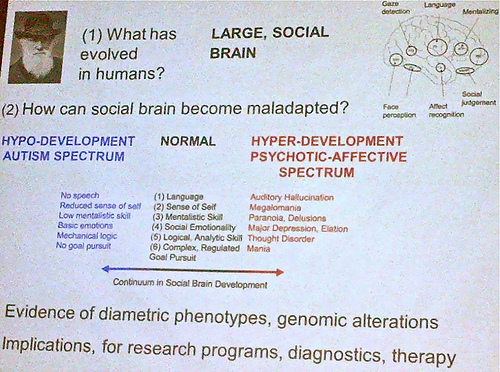


The Iowa Center for Public Affairs Journalism website, IowaWatch, published a very thought-provoking article yesterday by staff writer Sujin Kim. Entitled “Adults with autism struggle getting jobs, assistance,” Kim’s article combines text, photography, and video in a multi-dimensional look at the needs of people with disabilities and whether they are being met adequately by employers and support services in the state.
The main point Kim attempts to drive home is that there is a gap in support that exists for people on the autism spectrum who are considered higher functioning. Ron Wright is the lead subject of her article, a 54-year-old man of normal intelligence who has had a difficult time holding a job because of how his disability affects his understanding of workplace interactions. He tells Kim:
I didn’t know: How do they know how close together to stand? How do they know what to talk about? There are unwritten rules that I didn’t know about — social context.
For the longest time, Ron didn’t even know he had a disability. If he were a few decades younger, his condition may have been diagnosed at a time when he was still eligible for for the type of school programs that create job opportunities for people with disabilities. Instead, he has struggled to communicate effectively even during job interviews; yet his autism is not considered severe enough to qualify for Medicaid or help from state agencies that provide provide career training or employment support services to people with disabilities.
The sad irony of the whole situation is, now that Ron understands that his struggles with workplace interactions stem from his disability, the best way to overcome his difficult would be to have a job with the right accommodations in place. This article by Maiken Scott for the WHYY News companion website, NewsWorks, says the assembly and fulfillment work created by “Crazy Aaron’s Thinking Putty” has reduced arguments and other behavioral problems at the Don Guanella Village contract services center in Springfield, Pennsylvania.
The founder of the novelty item, Aaron Muderick, tells Maiken it would cost him less to outsource the work overseas, but he has had an admiration for the work done by people with disabilities ever since he had a high school job in a dog tag factory, and “the only employees who seemed to really care about the job was a group of people with intellectual disabilities.”
In Akron, Ohio, an agricultural project by the organization Ardmore, Inc. is proving to have similar behavioral benefits for its clients. Reporter Mary Beth Breckenridge of the Akron Beacon-Journal filed this story about the program earlier in the month, in which director Laura Gerlich explained:
The project has proved therapeutic for the participants, many of whom have autism. The deep pressure involved in the pushing and pulling motions of gardening is calming […] and the outdoor work and repetitive motions are also beneficial. Those with attention deficit disorder can often focus better in the garden than they can indoors… The work helps relax them, enhancing their capacity for learning and giving leaders an opportunity to model appropriate behavior and interaction in a nonthreatening environment… Many of the participants find it easier to converse with others when part of the brain is engaged with gardening tasks.
Just another example of how work can help make life matter for people with disabilities without negatively impacting a companies’ bottom line; hopefully, some employer will give Ron Wright a similar chance.
Comments?
Image by Steve Jurvetson.
Great Article! Thank you for sharing this is a very informative post, and looking forward to the latest one.
Excellent post! Thank you for giving us an idea about this. Looking forward to the next one
I found a thought-provoking article on IowaWatch about the challenges faced by adults with autism in finding employment. It highlights the gap in support and the need for more inclusive opportunities. The stories of individuals like Ron Wright and initiatives like “Crazy Aaron’s Thinking Putty” demonstrate the positive impact of accommodating workplaces. It’s an important read that raises awareness about the experiences of people with disabilities in the job market.